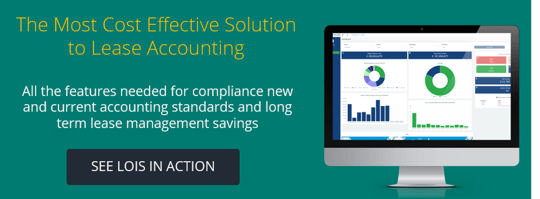Preparation Deadline for New Lease Accounting is Sooner Than We Thought
Updated 17th May 2021 | 5 min read Published 2nd September 2016

Following the announcement of IFRS 16 and FASB ASC 842 earlier this year, businesses can begin the process of implementing the new global lease accounting standards. However, they need to start preparations now if they want to meet them.
The deadlines
International companies under IASB jurisdiction will need to employ the new standard for financial periods after 1st January 2019 and some US entities using FASB will need to start from 15th December 2018. However, although these dates seem like a while away, the deadline for preparation is far sooner.
Businesses that choose to employ the more accurate full retrospective accounting treatment during the first implementation of IFRS 16 or FASB ASC 842 will need to report comparative figures. In order to achieve full compliance and a smooth transition, entities using this method will need to produce comparative reports for up to 2 years before the implementation date. This means businesses using FASB guidelines will need to provide financial figures using both FAS 13/Topic 840 and the new standard for the fiscal years 2017 and 2018.
What’s more is, in order to produce these retroactive reports, businesses will need to collect review historic lease data for every lease within their full lease portfolio. Unless they’ve implemented a lease management process or software platform, this will no doubt be a complex and time consuming task. Leases need to be identified, consolidated and analysed to effectively source the required data; a particularly difficult task for large and global corporations with numerous leases across departments, sites and geographies.
Businesses will need to identify all leased equipment, including assets they may be unaware are currently under contract. A tedious and company-wide operation, companies are advised to use lease accounting and management software to ease the organisational and operational burden.
Accountancy firms have warned that this process could take up to 12 months, especially for those with numerous leases or no prior lease management in place. A study by EY has highlighted that around 80% of businesses are still evaluating technology options; the research, confirmation and implementation involved in this evaluation process will take more time off the impending deadline for lessees to prepare for the new standard.
With this in mind, alongside the required retrospective reports, the deadline to organise your business’s leases is closer to the end of 2016. That does not leave us with much time to get potentially hundreds or thousands of assets under lease prepared to comply with the new accounting standards.
Why are so many unprepared?
Research has revealed that less than 10% of companies are prepared to comply with the new lease accounting standards. A mere 7% have started an inventory of their current leases and a worrying 29% do not have any prior system to track their lease agreements; 83% have not even started to create a budget for the transition. So why is such a large proportion so ill-prepared, when 90% revealed they are aware of the new standards?
The discussions surrounding global lease accounting have so far spanned nearly a decade. With several meetings, deliberations and two exposure drafts, it is understandable that executives and directors from finance, accounting and reporting departments have gradually lost interest and become complacent.
However, in the last year, progress has increased dramatically and both IFRS 16 and ASC 842 have now been published. This delay and sudden shift in progress may be one of the reasons many lessees have not taken then time to prepare their leases for implementation.
Lease management, although highlighted as an important investment opportunity, is not often considered a priority and therefore, many organisations have yet to implement a standardised system for agreeing, overseeing and managing their active and new lease contracts.
It is these companies who are relying on archaic paper-based or spreadsheet centred methods
of storing their important lease documents and data, which requires a great deal of manual processing. Lease management has remained an inefficient procedure in many organisations as they haven’t seen the need to replace these outdated systems with a time, resources and cost saving alternative.
With the interest to reduce associated costs and secure an ROI as part of this transition, these manual, inefficient systems of lease management are no longer acceptable and with the complexity involved in recording the new lease accounting treatment, auditors like PwC have warned against relying on spreadsheet accounting alone.
Businesses need to get back on track
With so few companies aware of how long implementation will truly take, let alone prepared to comply with them, there is a risk that these companies will miss the fast approaching deadline for data gathering. Many of the lead accounting firms are urging managers to begin the process of gathering their lease data and develop a plan of action immediately to ensure they are able to maintain compliance.
“2019 may sound a long way off, however there is going to be a significant amount of complexity in applying this standard. Potentially a lot of work to initially identify the relevant agreements and then the complexity of what to do with them, once you’ve found them!”
PwC, November 2015
The best way for companies to guarantee the preparation process is swift and efficient is to look into lease accounting software solutions. Businesses will need to collect all of their active leases as part of their provisions and by uploading all these lease agreements onto specialist software, they can deliver the analysis and reports required for full compliance with the new standards.
Once they’ve completed the centralisation and lease data sourcing process, lessees should conduct an initial lease accounting impact assessment. This will highlight what leases will fall under the scope of IFRS 16/ASC 842, how their accounting treatment will change and the impact this will have on financial statements and stakeholder relationships. With this basepoint of information, your business will be in a much stronger position to implement an effective and profitable transition strategy that is specific to your leasing requirements.
It is imperative that organisations begin to discuss the topic and assign a team to develop a strategy for the company’s conversion to the new lease accounting regulations. Although there is still time to adequately begin the preparations, the implementation will be upon us before we know it and those who have not taken the initiative, risk missing their window of opportunity.
For more information about how lease accounting is set to affect businesses or how Innervision and LOIS are helping companies achieve full compliance alongside savings, get in touch with one of our leasing experts.
Share this Article:




